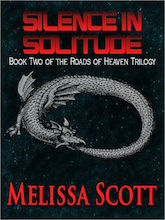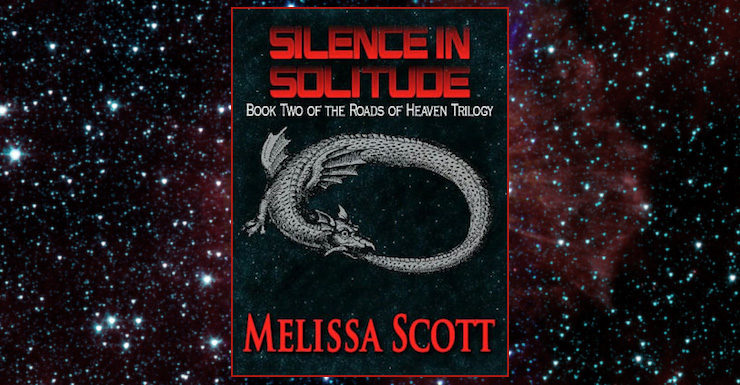Silence in Solitude is the second volume of Melissa Scott’s The Roads of Heaven trilogy, the first volume of which I reviewed in my last column. This is one of the few early science fiction series built around queer characters, published at a time when most books with QUILTBAG+ themes were standalone releases. The adventures of space pilot Silence Leigh and her two husbands continue, but the story doesn’t quite go where I would have expected it to go… In order to find an ancient tome that could help the characters reach the long-lost, mythical Earth, they need to rescue a planetary governor’s daughter from the heart of the empire.
Without getting into spoiler-y plot details, Silence is studying in a magic academy at the beginning of the book, and the author delves into the popular magic-school theme for all it’s worth, here. The initial chapters show us not only how the magic works in practice, but Silence also hits all the usual beats, going to the library, taking a scholarly examination, and so on. Even though the focus of the book shifts soon after, these chapters are very rich, revealing a detailed approach to the entire setting; they are also dynamic and tense—especially the examination scene. I could read a whole book set in this section of the world, and another, and another. In its highly detailed approach, it reminded me slightly of Vita Nostra by Marina and Sergey Dyachenko, which I read in Hungarian translation (but a new English translation is coming in Fall 2018).
From here, the plot moves on to the rescue mission. We observe the oppressive Hegemony from up close, closer than in the first novel, and it seems to be inspired by the Ottoman empire—except without the religious aspect, the lack of which I discussed in my previous review. The inspiration is relatively loose, though there is the occasional turban and elaborate beard, and the pseudonym Silence uses as an infiltrator is the Arabic name Jamilla. I frankly felt that these elements seemed extraneous, and made me wary of the narrative; it would probably have been better to keep the setting more distant from Earth analogs and not tie gender oppression to Muslim cultures, even briefly. (Though the magic used seems to be Western European in origin, with Christian overtones like the giant musical organ powering spaceships; however, the interplay of these disparate elements is not tackled in the first two books.)
Through this setting, the novel examines restrictive gender roles, but in a much more subtle way than what one would expect, based on these surface trappings. Silence goes from passing as a young male magical apprentice (though some do know that she is a woman) to passing as a very traditionally feminine woman in order to infiltrate the Women’s Palace in the capital planet of the Hegemony. She struggles with both identities, even though she is described as being one of those few people who could probably pass as any desired gender, in terms of physical appearance. She has difficulties with the behavior expected of her, and just as much with the behavior of people around her. She can and does adapt, but not without experiencing internal turmoil.
It is paradoxically comforting to see that Silence is not perfect. One of the high points of the book comes at a moment when she grows frustrated with the women cloistered in the Palace—but she cannot see past her own feeling that she has to be better than them, as a woman living in an almost exclusively men’s world in her role as a pilot. And the women notice, understand, and call her on this without any hesitation: “There was a moment’s dangerous quiet, and then Aili said, very slowly, ‘You don’t like women very much, do you, ‘Jamilla’?’” Silence not only has to recognize and understand her own internalized misogyny, but has to take it into account to be able to carry out the rescue. She needs to realize that the women and girls she meets in the palace are not ignorant or inferior. She has to come to terms with the fact that she has been the kind of person who thinks and says of herself that she’s not like those other girls.
When we see strong women protagonists in SFF, even today, we all too often encounter the trope of the exception to the rule, of being “not like the other girls.” Silence in Solitude offers a powerful subversion of this conceit: Silence Leigh starts out certain that she is not like them, and she is forced to reassess her attitudes. She has to see past her own othering of the women nobles, who are disempowered in an oppressive society, but who still possess their own resourcefulness, dignity, and even have moments of fun and levity. I appreciated that the palace women were humanized instead of othered. Even the women who become adversaries of Silence in the course of her secret mission are still presented as well-rounded people who have good reasons for their actions, and are not presented as evil two-dimensional foils in the novel. At the same time, men aren’t represented as an oppressive monolith, either.
Buy the Book


Silence in Solitude
There are further interesting gender aspects at play in the book. As I mentioned in my previous review, The Roads of Heaven trilogy offers a positive portrayal of a polyamorous marriage, but in the first volume (Five-Twelfths of Heaven), the relationship begins as a marriage of convenience for legal reasons. In Silence in Solitude, we continue with the story after a time-skip and discover that the three characters have evolved into a much different dynamic, albeit one that was foreshadowed toward the end of the first book. We follow the events from Silence’s point of view, and she is now shown to be both romantically and sexually attracted to her husbands—though again, this aspect of the story never becomes the main focus amid the various space adventures.
We also see her two husbands being physically affectionate with each other, albeit briefly; I was glad to see this, because the nature of their relationship wasn’t clear to me from the first book. Were they a preexistent couple before they met Silence? I am still not entirely sure, and the very assertive Silence centers everything around herself, even sleeping sandwiched between the two men. (There are no sex scenes in the novel, and by the time the characters get to bed, they are usually completely exhausted by the events of the plot.) But we can definitely sense the attraction between all three characters, and Silence explicitly disclaims that theirs is a marriage of convenience on multiple occasions. The three of them love each other and, just as importantly, they work well together as not only a spaceship crew, but at also as a commando team, when necessary. The sexual and romantic elements might be deemphasized simply because of the social context in which the book was published in the 1980s, but frankly, the way the characters’ dynamic continues to develop through these two novels is very relatable to me as a demisexual person.
The final volume of the trilogy, Empress of the Earth, exists in two considerably different versions: Scott revised the novel for its more recent ebook release. I have both versions, and I intend to talk about them both in the next column! It is a testament to the first two volumes that I am happy to read two variants of the third one—while I do have some qualms, overall I am really enjoying this series.
Bogi Takács is a Hungarian Jewish agender trans person (e/em/eir/emself or singular they pronouns) currently living in the US with eir family and a congregation of books. Bogi writes, reviews and edits speculative fiction, and is currently a finalist for the Hugo, Lambda and Locus awards. You can find em at Bogi Reads the World, and on Twitter and Patreon as @bogiperson.










